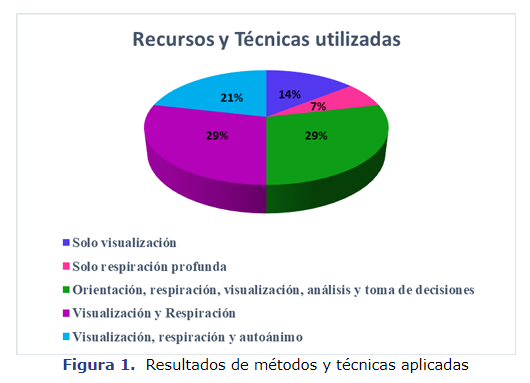Diagnosis of the psychological preparation of archers
Main Article Content
Abstract
La preparación psicológica para la ejecución inmediata de la acción deportiva es el momento de mayor responsabilidad en todo el período de preparación para la competencia. En la arquería, el deportista cuenta con pocos segundos antes de ejecutar cada disparo, en ese tiempo debe desplegar con efectividad su máximo potencial. En la práctica, dificultades en este proceso, ocasionan inestabilidad en la correcta ejecución y deterioro del rendimiento. El objetivo es diagnosticar el estado de las acciones de preparación psicológica inmediata antes de la ejecución del disparo en arqueros cubanos de alto rendimiento. Para ello, se utilizaron los métodos: analítico-sintético, observación, entrevista, un cuestionario para evaluar la dinámica entre disparos y la triangulación. Los principales resultados permitieron constatar dificultades en cuanto a la estructuración y funcionalidad de las acciones de preparación, pues los atletas suelen modificar el tiempo, el contenido y en ocasiones, descuidan la puesta en práctica de las mismas. Se identificaron como aspectos causantes de dichas modificaciones: ansiedad, estrés, presión competitiva, dificultad o significación de la actividad, inseguridad y pensamiento orientado al resultado. Estos elementos afectan la concentración y el control emocional durante las acciones competitivas, ocasionando inestabilidad en el rendimiento.
Downloads
Article Details

This work is licensed under a Creative Commons Attribution-NonCommercial 4.0 International License.
Those authors who have publications with this journal, accept the following terms of the license Attribution-NonCommercial 4.0 International (CC BY-NC 4.0):
You are free to:
Share — copy and redistribute the material in any medium or format
Adapt — remix, transform, and build upon the material
The licensor cannot revoke these freedoms as long as you follow the license terms.
Under the following terms:
Attribution — You must give appropriate credit, provide a link to the license, and indicate if changes were made. You may do so in any reasonable manner, but not in any way that suggests the licensor endorses you or your use.
NonCommercial — You may not use the material for commercial purposes.
No additional restrictions — You may not apply legal terms or technological measures that legally restrict others from doing anything the license permits.
Notices:
You do not have to comply with the license for elements of the material in the public domain or where your use is permitted by an applicable exception or limitation.
No warranties are given. The license may not give you all of the permissions necessary for your intended use. For example, other rights such as publicity, privacy, or moral rights may limit how you use the material.
References
Bassham, L. R. (2012). With winning in mind (3 ed.). Mental Management System.ISBN: 9781934324264.
Bell, R. J., Cox, K. E., y Finch, W. H. (2010). Pre-Putt Routines and Putt Outcomes of Collegiate Golfers. Journal of Sport Behavior, 33(3), 239-257. ISSN: 0162-7341
Blumberg, J. M. (2014). An Examination of Behavioral and Temporal Consistency of Pre-Performance Routines in NCAA Division I Basketball Free Throw Shooting -A Naturalist Observational Investigation. Master of Science in kinesiology-sport pschology, Georgia Southern University, Statesboro, Georgia. Recuperado el 12 de Septiembre de 2019, de https://digitalcommons.georgiasouthern.edu/etd/1101
Callaway, A. J., Wiedlack, J., y Heller, M. (jun de 2017). Identification of temporal factors related to shot performance for indoor Recurve archery. Journal of Sports Science , 35(12), 1142-1147. doi:10.1080/02640414.2016.1211730
Dosil, J. (2004). Entrenamiento Mental: Preparación Psicológica de entrenamientos y competiciones. En J. Dosil, Psicología de la actividad física y del deporte(págs. 323-361). Madrid, España:McGRAW-HILL/INTERAMERICANA DE ESPAÑA.S. A. U.ISBN: 84-481-4067-2
Dzhamgarov, T. T. y Puni, A. T. (1979). Psicología de la competencia deportiva. En Psicología de la educación física y el deporte (págs. 125-132). La Habana, Cuba: Editorial Cientifico-Técnica.
Gould, D., Flett, M. R., y Bean, E. (2009). Mental preparation for training and competition. En B. W. Brewer, y B. W. Brewer (Ed.), Sport Psychology. Handbook of Sports Medicine and Science (pp. 53-63). USA: Wiley-Blackwell. A John Wiley y Sons, Ltd., Publication.
Hazell, J., Cotterill, S. T., y Hill, D. M. (2013). An exploration of pre-performance routines, self-efficacy, anxiety and performance in semi-professional soccer. European Journal of Sport Science, 14(6), 603-610. doi:10.1080/17461391.2014.888484
Kim, H-B, Kim, S-H, & So, W-Y. (2015). The relative importance of performance factors in Korean archery. Journal of Strength and Conditioning Research, 29(5), 1211-1219.doi: 10.1519/JSC.0b013e3181f0a8a3
Lameiras, J., Almeida, P. L., Pons, J., y Garcia-Mas, A. (2014). Incorporación de una rutina para la optimización del rendimiento deportivo. Revista de Psicología del Deporte, 23(2), 337-343. Recuperado el 21 de septiembre de 2019, de http://www.redalyc.org/articulo.oa?id=235131674013
Lee K. & Bondt R. (2005). Entrenamiento Mental. En K. Lee, y R. de Bondt, Total Archery (pp. 151-168). SAMICK SPORTS CO. LTD.
Pérez, J. L. (2017). Asuntos de entrenamiento mental específico en el Tiro con Arco. Recuperado el 21 de noviembre de 2019, de World Archery, Mental Management University; Ten Zone: http:/mentalmanagementcourses.com/steps-to-mastery/; www.tenzone.uk
Perry, I. S., y Katz, Y. J. (2015). Pre-Performance Routines, Accuracy in Athletic Performance and Self-Control. Athens Journal of Sports, 2(3), pp. 137-152. doi:10.30958/ajspo.2-3-1
Sánchez, M. (2005). Psicología del entrenamiento y la competencia deportiva.La Habana: Editorial Deportes.
Singer, R. N. (2002). Preperformance state, routines, and automaticity: What does it take to realize expertise in self-paced events? Journal of sport and exercise psychology, 24(4), pp.359-375.ISSN: 1469-0292.

